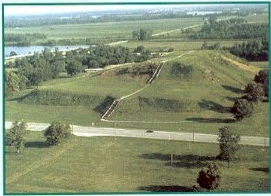Myth/Placed
Other outbursts of self-expression:
 I
must have mythed out when they were explaining "mythic places,"
because I can't make up my mind whether they're places of legend or legendary
places.
I
must have mythed out when they were explaining "mythic places,"
because I can't make up my mind whether they're places of legend or legendary
places.
The real world I live in is more abused than ancient, like an old porch railing that has been scraped and painted a dozen times but never stripped, so that a thick, irregular surface obscures the detail of the wood. Ohio has been cut-over, dug under, drained, plowed and paved for 200 years, and at this point, the rich lands that pioneers found when they went "beyond the Allegheny" are themselves the stuff of legend. For heroes, we have Ulysses Grant and James Garfield, and stolid regiments who went to fight at Chickamauga or Chattanooga.
Hardly "mythic," at least not yet. For mythic, I want great deeds, long enough gone to have lost their gory details and gained that extra dimension storytellers add, of moral significance and the sense that we are not alone on the surface of the Earth, that there is more to what I see than what I understand.
After 200 years, we're still strangers in this land. The Erie, the Wyandot, the folks whose ancestors lived and told stories here are gone, and the stories that scholars have collected aren't meaningful to me, child of a far different culture. I have stood and wondered at some of the earthworks a lost people built in the southern part of the state -- but myth? I wish I knew enough.
 I
climbed once to the top of the Cahokia Mound on the plains of Illinois
opposite St. Louis. The earthwork stood at the center of a great city
of 30,000 people until 1300 AD. What I saw was haze and the odd ranch
house, but the archaeologists have reported lost dwellings everywhere,
signs of a complex society, and courtyards possibly used for games. Surely
over four or five centuries, that green place could boast of great deeds
and higher meanings -- but when you come down to it, I know more about
the Babylonians. Could it be one of the cities of Mormon teaching? More
homework to do.
I
climbed once to the top of the Cahokia Mound on the plains of Illinois
opposite St. Louis. The earthwork stood at the center of a great city
of 30,000 people until 1300 AD. What I saw was haze and the odd ranch
house, but the archaeologists have reported lost dwellings everywhere,
signs of a complex society, and courtyards possibly used for games. Surely
over four or five centuries, that green place could boast of great deeds
and higher meanings -- but when you come down to it, I know more about
the Babylonians. Could it be one of the cities of Mormon teaching? More
homework to do.
Maybe somewhere out there, there's a legend worth traveling to. You know, a myth is as good as a mile.
Back (usually)
Top (If you'd rather)